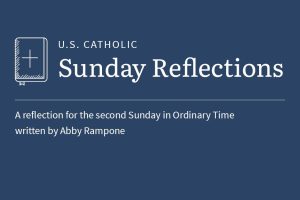Readings (Year B):
Ezekiel 2:2 – 5
Psalms 123: 1 – 2, 2, 3 – 4
2 Corinthians 12: 7 – 10
Mark 6: 1 – 6
Reflection: Celebrate the gifts of the whole community
The other day as I was walking into the grocery store, I happened upon a delightful conversation. A toddler was walking hand in hand with his father and trying to figure out the difference between the word “you” and “me.” He pointed to himself and said “you?” And his dad gently said, “no,” and lovingly redirected his son’s pointed finger. Then the boy said “you” again, this time pointing at his father. And with single minded concentration turned his hand and pointed to himself and said, “me.” He looked to his father for approval and smiled when his dad congratulated him and then he repeated his newfound knowledge: “you” and “me.”
Such a simple distinction, “you” and “me”—and yet so profound when you think of all that has been made of it. In childhood it may begin with the most heartfelt and innocent of realizations, that someone other than yourself is important to you. “I love you,” a child repeats to their mother and father. What does a child mean by this? It’s hard to say, but it certainly means “you” are unique and special to “me” in a way no one else is. I often think that in family and extended family contexts the phrase “I like you” says even more. In these contexts where people often say they love their family members, to hear they actually like you can be surprisingly meaningful. To be seen and appreciated is one of the fruits of recognizing the difference between “you” and “me.”
In “you” and “me” there’s an acknowledged distinction. I am not “you.” “You” are not “me.” This can be understood in many ways. Some cultures are more individualistic, so the concepts of “you” and “me” may first speak to our separateness. Other cultures are more sociocentric and so “you” and “me” may first speak of togetherness. When you think of “you” and “me” what do you think of first: togetherness or separateness?
In today’s gospel we are told Jesus returns to his native place, surrounded by his family. He has been away. They have heard amazing things about him in his absence. Now he has returned as a teacher. The potential is there to embrace either togetherness or separateness. To celebrate who he has become and take joy that a member of their community, a member of their family has blossomed into something extraordinary. Or, to pull away in skepticism, perhaps jealousy, and tear down.
Togetherness or separateness: it’s a choice. St. Paul loves the image of the church as the body of Christ, and the idea that we all have something unique we contribute to the whole. Instead of being jealous of the gifts the spirit has given, we celebrate those gifts and lift them up for the good of the community.
The gospel says Jesus, “was not able to do any mighty deeds there” due to their disbelief. They chose separateness. Imagine what might have happened had they chosen togetherness. Imagine all the good not only Jesus would have done but others would have done through his teaching and example. This question isn’t limited to the past but is applicable today. What if we as a church chose togetherness instead of separateness? What if we celebrated and lifted up all the gifts of the spirit that God gives “you” and “me”?












Add comment